Small and Medium Sized Mammal Inventory of Everglades National Park and Big Cypress National Preserve
Authors
Emily K, Pifer1, Jennifer L. Eells1, Jean Olbert1, Frank J. Mazzotti1, and Kenneth G. Rice2
Introduction
Effects of ecosystem restoration and exotic species on native populations are an increasing concern in south Florida. Small and medium sized mammals are ecologically critical as a food base, predators, vectors for disease and seed distribution, and providers of numerous other connections in the natural system. As restoration proceeds, data on these native populations should be accessible to managers and planners. Despite their importance, these taxa have not been systematically inventoried in South Florida since the mid 1950s. To fill this void, we inventoried upland, wetland, and coastal habitats in Everglades National Park (ENP) and Big Cypress National Preserve (BCNP).
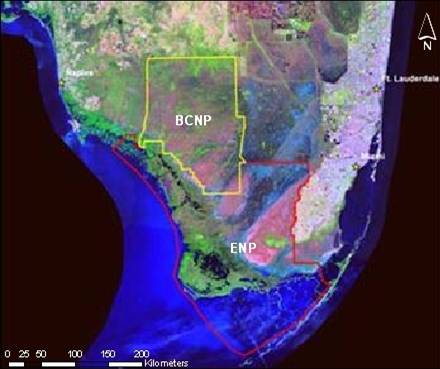
Materials and Methods
- A species habitat matrix for mammals within the two parks was constructed from existing literature sources.
- Using this matrix, we conducted a systematic samling effort using a Proportion Area Occupied (PAO) approach to estimate the probabilities of detection of each species per habitat.
- We then determined rare species of special interest for specialized sampling stragies at a later date.
Methods included:
|
Traveling in parks was accomplished by:
|
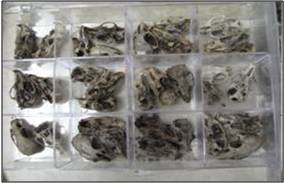
Mammal Skulls--found in dissection of owl pellets at ENP
Results
Of the 29 mammalian species cited as occuring in ENP and BCNP, confirmation of presence in the study area was only possible for 23 species. The Everglades mink (Mustela vison), Southern flying squirrel (Glaucomys volans), Striped skunk (Mephitis mephitis), and Norway rat (Rattus norvegicus) were only documented in one of the two parks, or in such low numbers that we are now focusing our sampling efforts on these target species.

Comparison of the number of individuals captured per park. Some of the more common species detected included the Opossum and the Black rat.
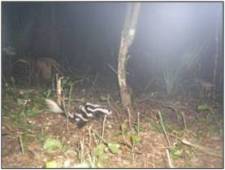 |
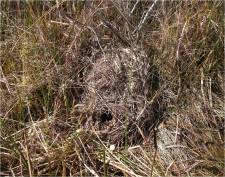 |
| Spotted skunk (Spilogale putorius) caught on an Olympus camera trap at BCNP. | Example of a Round-tailed muskrat (Neofiber alieni) lodge found in BCNP. |
Species data can be summarized by habitat, method of detection, and species detected. This allows us to predict the best methods for detection of a certain species in a given habitat type using the PAO method. According to the tables below, hammocks in both BCNP and ENP have the highest species richness. Camera traps have proven to be the most effective detection method.
BNCP Species Present Table
| Presence | Habitat | ||||||||
|---|---|---|---|---|---|---|---|---|---|
| Common Name | Confirmed | Uncomfirmed | Pine | Hammock | Cypress | Cypress-Prairie | Prairie | Other | |
| Raccoon | Procyon lotor | XLS, C, P, RK | LS, C | LS, C. P | LS, RK, C | RK, C, LS | LS, RK, C | C | |
| Opossum | Didelphis virginiana | XLS, C, RK | LS, C | LS, RK, C | RK, C, LS | RK, C | C | C | |
| Marsh Rabbit | Sylvilagus palustris | XC, P, RK, LS | C, P | RK, C | LS, C, RK | C | LS, C | ||
| Bobcat | Lynx rufus | XLS, C, RK, P, S | LS, C, P | LS, RK, S, C | C | P, RK, C | C | C | |
| River otter | Lutra canadensis | XLS, RK, C | LS, RK | LS, RK | C | ||||
| Nine-banded armadillo | Dasypus novemcinctus | XLS, C, RK | LS, C | LS, RK, C | C | LS | C | ||
| Cotton mouse | Peromyscus gossypinus | XC, LT | C | LT, C | LT, C | LT | |||
| Rice rat | Oryzomys palustris | XLS, C, RK, LT | LS, C | RK, LT, C | LT, C | LT, C | |||
| Cotton rat | Sigmodon hispidus | XC, LT, LS, OP | C | LT, LS, OP C | LT | LT, C | |||
| Black (roof) rat | Rattus rattus | XRK, C | RK, C | ||||||
| Round-tailed muskrat | Neofiber alleni | XLS, OP | LS | OP | |||||
| Least shrew | Cryptotis parva | X | |||||||
| Short-tailed shrew | Blarina carolinensis | XLT, OP | LT, OP | ||||||
| Eastern cottontail | Sylvilagus floridanus | XLS | LS | ||||||
| Gray fox | Urocyon cinereoargenteus | XLS, RK | LS, RK | ||||||
| Coyote | Canis latrans | XC, LS | C | LS | LS, C | C | |||
| Gray squirrel | Sciurus carolinensis | XLS, C | LS | LS, C | LS, C | LS | C | ||
| House mouse | Mus musculus | XC, LT | C | LT | LT | LT | |||
| Everglades mink | Mustela vison | XLS | LS | ||||||
| Fox squirrel | Sciurus niger avecennia | XLS, P | LS | P | LS | LS | |||
| Domestic cat | Felis domesticus | XC, RK, LS | C, RK | RK, LS | |||||
| Domestic dog | Canis familiaris | XC, Rk, LS | C, RK, LS | LS | |||||
| Red fox | Vulpes vulpes | X | |||||||
| Norway rat | Rattus norvegicus | X | |||||||
| Striped skunk | Mephitis mephitis | X | |||||||
| Eastern spotted skunk | Spilogale putorius | XC, RK, LS | C | RK, C | LS | ||||
| Long-tailed weasel | Mustela frenata | X | |||||||
| Southern flying squirrel | Glaucomys volans | X | |||||||
| Eastern mole | Scalopus aquaticus | X | |||||||
C = Camera LS = Live Sighting S = Scat RK = Roadkill LT = Live Trap P = Print OP = Owl Pellet
ENP Species Present Table
| Presence | Habitat | ||||||||
|---|---|---|---|---|---|---|---|---|---|
| Common Name | Confirmed | Uncomfirmed | Pine | Hammock | Slough | Marl-Prairie | Mangrove | Other | |
| Raccoon | Procyon lotor | XC, LS, P, S, RK | S | C, S, RK | C, P, RK, LS | P, S | C, LS, P, S | ||
| Opossum | Didelphis virginiana | XC, LS, RK, S, P | C, LS | C, LS, S | S, P | C | RK | ||
| Marsh Rabbit | Sylvilagus palustris | XC, LS, OS | C, LS | C | C, LS | OS | |||
| Bobcat | Lynx rufus | XC, P, S | C, S | S | P | S | |||
| River otter | Lutra canadensis | XLS, P, S | S, LS | LS, P | P | ||||
| Nine-banded armadillo | Dasypus novemcinctus | XRK, LS | LS | RK | |||||
| Cotton mouse | Peromyscus gossypinus | XC, LT | C | LT | |||||
| Rice rat | Oryzomys palustris | XLT, C, OP, P | C | LT | C, P | LT, C | OP | ||
| Cotton rat | Sigmodon hispidus | XLT, C, RK, LS, OP | LT, C, RK, LS | LT, C, RK, LS | C, LS | C | OP | ||
| Black (roof) rat | Rattus rattus | XLT, C, OP, P, LS | LT, C, LS | C, P, OP | C | LT, C, P | OP | ||
| Round-tailed muskrat | Neofiber alleni | XOS | OS | OS | OP | ||||
| Least shrew | Cryptotis parva | XLT, OP, OS | LT | OS | OP | ||||
| Short-tailed shrew | Blarina carolinensis | XLS, OP | LS, OP | ||||||
| Eastern cottontail | Sylvilagus floridanus | XRK, C | C | RK | |||||
| Gray fox | Urocyon cinereoargenteus | XRK, P, LS | P | LS, P | RK | ||||
| Coyote | Canis latrans | XLS, OS, S, P, C | S, P, LS | LS, S, P | OS, P, S | OS, S, P, C | |||
| Gray squirrel | Sciurus carolinensis | XC, LS, RK | C, LS | C, LS, RK | |||||
| House mouse | Mus musculus | XOS | OS | ||||||
| Everglades mink | Mustela vison | XP | P | ||||||
| Fox squirrel | Sciurus niger avecennia | XLS | LS | LS | |||||
| Domestic cat | Felis domesticus | XRK, LS | RK, LS | ||||||
| Domestic dog | Canis familiaris | XC, LS, P, S | P | S | S | C | LS, S | ||
| Red fox | Vulpes vulpes | X | |||||||
| Norway rat | Rattus norvegicus | X | |||||||
| Striped skunk | Mephitis mephitis | X | |||||||
| Eastern spotted skunk | Spilogale putorius | X | |||||||
| Long-tailed weasel | Mustela frenata | X | |||||||
| Southern flying squirrel | Glaucomys volans | X | |||||||
| Eastern mole | Scalopus aquaticus | X | |||||||
C = Camera LS = Live Sighting S = Scat RK = Road Kill LT = Live Trap P = Print OP = Owl Pellet OS = Other
Future Directions
Specialized survey techniques are in use for six species that have not been found in either ENP or BCNP, or both. These include the Norway rat, Southern flying squirrel, Everglades mink, Eastern cottontail, Round-tailed muskrat, and the Eastern spotted skunk.
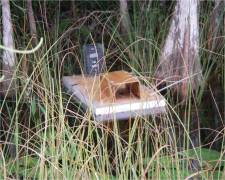 |
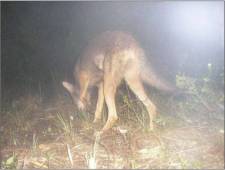 |
| Floating raft designed to detect the Everglades mink (Mustela vison). | Coyote (Canis latrans) caught on Olympus camera trap at BCNP. |
In addition, a GIS layer for each mammal species is being developed for use in modeling, prescribed fire planning, and long term monitoring. By understanding the current status of these species, we can ensure that they will be considered as key components in future restoration efforts.
(1) Ft. Lauderdale Research and Education Center, IFAS, University of Florida
(2) USGS, Florida Integrated Science Center
Citation
Pifer, E.K., J.L. Eells, J. Olbert, F.J. Mazzotti and K.G. Rice. (2009, July). Small and Medium Sized Mammal Inventory of Everglades National Park and Big Cypress National Preserve. Poster presented at the 3rd National Conference on Ecosystem Restoration.




